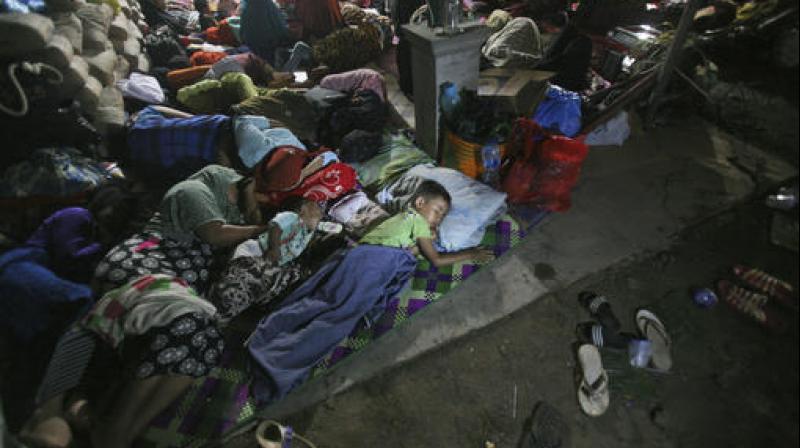Rescuers comb Indonesia earthquake rubble for second day

Meureudu: Rescue workers, soldiers and police combed through the rubble of a devastated town in Indonesia's Aceh province, on Thursday, resuming a search for earthquake survivors that was halted at night by rain and blackouts.
Nearly 100 people died in the shallow and powerful quake that struck northeast Sumatra before dawn on Wednesday. Hundreds were injured and dozens of buildings were destroyed. The worst damage appears to be in Pidie Jaya district near the epicenter, but assessments of the region are still underway.
Scores of rescue personnel were crawling over a market in Meureudu, the hard-hit town, where many shop houses collapsed. One shop owner, Hajj Yusri Abdullah, didn't hold out much hope of finding survivors. He said nearly two dozen bodies were pulled from the market debris the day before. They included a group of eight made up of a newlywed couple and family members holding an ornate celebration known as Antar Dara Baro.
Some people spent the night outdoors while thousands of others took refuge in mosques and temporary shelters.
Many were homeless after the magnitude 6.5 quake destroyed or damaged their homes and others were too scared to return home. Killer quakes occur regularly in the region, where many live with the terrifying memory of the giant December 26, 2004, earthquake that struck off Sumatra. The magnitude 9.1 quake triggered a devastating tsunami that killed more than 100,000 Acehnese.
Aceh's disaster mitigation agency said, on Thursday, the death toll had risen by 1 to 98 and more than 8,000 displaced people were at several shelters in Pidie Jaya. The Indonesian government has declared a two-week emergency period in Aceh and some aid was already reaching hard-hit areas.
Humanitarian organization CARE said it would was leading a joint assessment mission of four international aid organizations.
"It will take several more days to get a full picture of the impact," CARE's Indonesia director Helen Vanwel said in a statement. "We know from experience that after an earthquake of such a scale, people urgently need water, shelter, food and medicine," she said.
The Indonesian Red Cross deployed emergency response teams and announced bank accounts for donations.
Its Head of Disaster Management, Arifin Hadi, said five water trucks had been sent into the quake area. Aid, including hygiene kits, tarpaulins, jerry cans, blankets and family assistance kits, is being distributed, with more to be sent from Jakarta, he said. The International Organization for Migration sent an assessment team to Aceh.
The U.S. Geological Survey said the earthquake was centred about 19 kms (12 miles) southeast of Sigli, a town near the northern tip of Sumatra, at a depth of 17 kilometers (11 miles). The agency had initially placed the epicenter undersea. It did not generate a tsunami.
Siti Rukiah, 51, a mother of four, was among the many people who took refuge for the night in local mosques. She and about 100 other people from Pante Raja, a seaside village in Pidie Jaya district, fled to Nur Abdullah mosque located on higher ground in a nearby hamlet.
She said the quake felt so powerful she had to grab onto a table to keep from falling down. She was sure a tsunami was coming.
"I'm really scared about a tsunami," said Rukiah, whose brother and neighbours died in the 2004 disaster. She said she didn't want to return home "not only because my house is damaged, but I am still afraid an aftershock could cause a tsunami."
Aceh's disaster mitigation agency said more than 600 people were injured. The national disaster agency said about 245 buildings were seriously damaged or destroyed in Pidie Jaya and neighbouring Bireuen district, including 14 mosques. The rest were mainly dwellings and shop houses. Roads also cracked and power poles toppled over.
The world's largest archipelago, Indonesia is prone to earthquakes due to its location on the Pacific "Ring of Fire," an arc of volcanoes and fault lines in the Pacific Basin. The 2004 quake and tsunami killed a total of 230,000 people in a dozen countries, most of them in Aceh.
John Ebel, professor of earth and environmental sciences at Boston College, said there is a risk of aftershocks that even if relatively weak could cause further damage to buildings, particularly because modern building codes aren't consistently enforced in Indonesia.
The general hospital in Pidie Jaya was overwhelmed with the numbers of injured, and many people were being treated in tents pitched on its grounds, according to its director Muhammad Reza Faisal.

